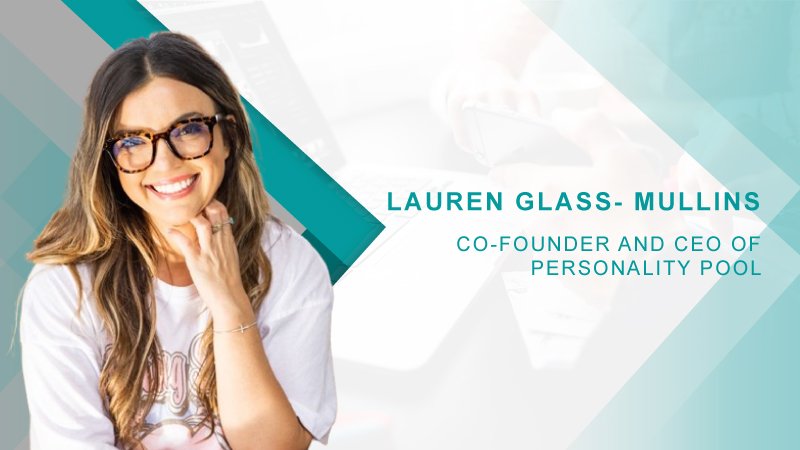Lauren, could you start by sharing a bit about your professional journey and what led you to co-found Personality Pool?
I would love to say I had some magical moment in my college business courses that gave me the idea for Personality Pool, but in a less glamorous turn of events, once I graduated from college I couldn’t get a job! I had decided I wanted to go into sales so I applied to so.many.jobs and would rarely (if ever) make it to the interview stage. It was frustrating because I knew I had the right personality for a sales role even with my resume lacking what these companies deemed “necessary relevant experience.” I kept thinking, “If I could just meet one of these hiring managers in person, I know I can get the job.” Long story short—I ended up meeting a hiring manager who took a chance on me because he could see I had the right personality for the job. This changed the trajectory of my entire life! I have carried this story with me for years and always knew that one day I wanted to find a way to give everyone the chance to show who they are beyond their resume when applying for very personality-driven jobs like sales, retail, hospitality, ultimately any job where dealing with people is what you will spend most of your time doing.
Personality Pool operates on the belief that resumes don’t fully capture a candidate’s capabilities or fit for a job. Can you elaborate on why this belief is central to your platform?
One sheet of paper can’t tell the story of a candidate and showcase the traits that matter when hiring for customer-facing roles (this is the vertical we shine in) We are all in ways programmed to keep our resumes safe. We try to make sure we check all of the boxes we know the reviewers will be looking for, and in turn, most resumes end up looking just alike. If you are looking for the right personality to fit your role–a resume will not get you there. You need to see someone’s personality! We waste so much time filtering through resumes scheduling pre-screen phone calls and interviews, which are steps all designed for you to get a glimpse of what? The candidate’s personality. Using a tool like personality pool saves time, money and hassle because we help you cut to the chase and get to the heart of what makes a good hire.
How does Personality Pool use AI to analyze responses to video questions, and what advantages does this method offer over traditional resume-based screening?
Our main goal in integrating an AI component was to ensure that AI was the supporting character—not the main character–so that humans remain the star of human resources. We only use AI to measure communication. We provide a communication score for each candidate, but our AI does not filter anyone out regardless of the score. It’s the hiring team’s job to consider the communication score while reviewing videos. Still, my favorite part is that we provide the recruiters with a place to rank and select their own personality scores. What someone considers a “good” personality is subjective and can change from role to role but I think we can all agree you know it when you see it! So, that is why it was important for us to let AI tell a part of the candidate’s story, but not the whole story.
In what ways does Personality Pool help reduce hiring bias, and how does the personality scoring system contribute to this goal?
Not all resumes are created equal, so we cannot keep measuring a candidate’s value based on a two-dimensional, traditional resume. Just because someone may be able to say on a resume they have x amount of work experience vs. someone who, for whatever reason, may not have extensive experience doesn’t make one more qualified than the other. But, if you were screening resumes you would almost always toss the one with no experience without a second thought. You can teach people how to sell your product, make your coffee or food, and how treat your customers—but you cannot teach someone how to be kind. You also can’t teach someone to be the right cultural fit.
Ultimately, character-based hiring evens the playing field because the traditional metrics (often all we see on a resume) that we use to determine what makes a good employee are out the window. It shifts focus to, “Is this personality a good fit for our team?” which gives people a chance to shine in a new way, which excites me the most.
Dr. Allen Gorman played a significant role in designing the pre-selected questions for Personality Pool. How does his expertise ensure fair and accurate talent screening?
Dr. Gorman’s research interests fall within five broad domains: 1) job performance, 2) leadership, 3) training and development, 4) well-being at work, and 5) individual differences in work behavior. Since 2012, Dr. Gorman has consulted with companies on using video-based technologies in the recruitment and hiring process, and he published one of the first peer-reviewed validation studies of asynchronous video interviews (AVIs) in 2018. Through his extensive research efforts and boots-on-the-ground work in this space, he has the perfect mix of real life experience and research insights, which helps our users craft the best questions possible while also constantly validating candidate scores on the back end of the platform.
Could you explain how Personality Pool speeds up the hiring process, especially for customer service-oriented roles?
Right now, we are saving hiring teams an estimated 2 hrs per candidate, which adds up quickly. The current recruitment process normally goes like this: screen resumes, schedule pre-screen calls, and schedule interviews. This scheduling process seems to be one of the larger pain points for our clients because there is so much back and forth between recruiters and candidates to line everything up. With Personality Pool, you can easily skip the pre-screen phone call portion (sometimes even the interview) because if you ask the right questions, you can get the same information you are looking for all in one step.
How does Personality Pool level the playing field for job seekers who feel marginalized by traditional hiring practices, and why is this important for customer-facing roles?
Resumes can inadvertently reveal factors such as educational background, previous job titles, and gaps in employment that may lead to unconscious bias, which again are all things that are not the MOST important when hiring for these customer-facing positions. Candidates from marginalized groups or those with non-traditional career paths might have picked up skills like resilience, creativity, and adaptability. These are super useful for customer-facing jobs but might not show up clearly on a regular resume. By focusing on personality, employers can make the hiring process more inclusive, giving chances to people with different backgrounds and experiences.
What advice would you give to employers looking to improve their hiring processes and better understand the capabilities and cultural fit of their candidates?
It’s time to look at your candidates differently and one way you can do this is by ditching the resume intake process. If you are looking to hire the best personalities you have to give candidates a new way to showcase their personality at the very beginning of the hiring process. We live in a tik tok/video driven world where people love to find new ways to showcase the things about themselves that make them unique—carry that energy into your hiring process and I think you’ll be blown away at all of the talent you’ll uncover.
As we wrap up, what are your final thoughts on the future of recruitment and the role tools like Personality Pool will play in shaping it?
AI doesn’t have to be scary when it comes to integrating it into HR practices! I think there are so many exciting ways to use it to make the recruitment process better for all parties involved. I also think personality-based recruitment is only getting started, that excites me. For what feels like the first time ever, the larger hiring conversations are more centered around non-traditional hiring practices for non-traditional candidates when it used to be “you need a bachelor’s degree plus five years experience or we aren’t even going to look at you” type conversations. How we view talent is changing and I am excited for Personality Pool to be a part of that shift.
Explore HRTech News for the latest Tech Trends in Human Resources Technology.

Lauren Glass- Mullins Co-founder and CEO of Personality Pool
Lauren, a Tennessee native and former sales executive, launched Personality Pool in 2022 with a mission to help employers “uncover hidden gems” in their candidate pools. The platform analyzes applicants' responses to insightful questions, providing employers with a detailed personality score and assessment. This character-based approach reduces hiring bias and speeds up the recruitment process, creating more opportunities for potential hires who may not tick all the standard resume boxes.

